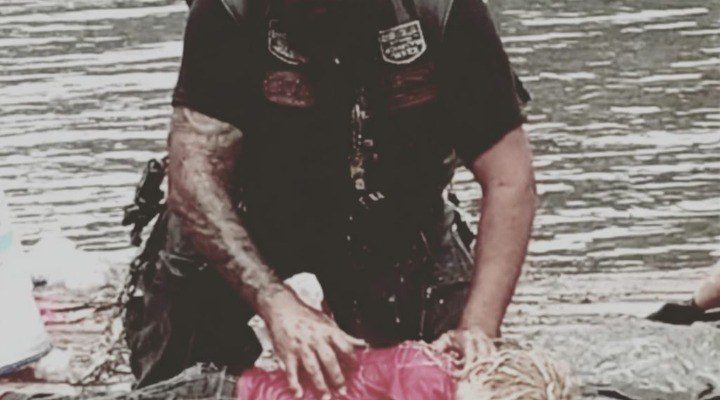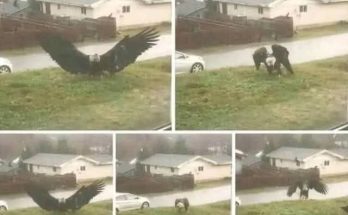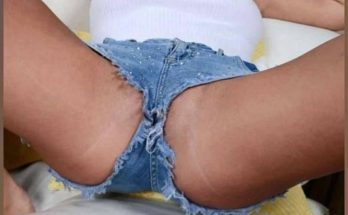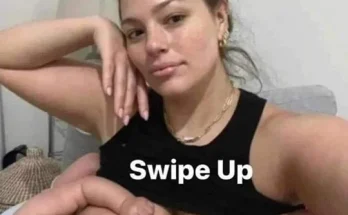A biker hauled my daughter’s limp body onto the dock while everyone else stood there screaming and pointing.
I was still underwater, lungs on fire, groping blindly through the dark where she’d vanished. When I burst to the surface, gasping, a huge bearded man in a leather vest was already over my little girl, pumping his tattooed hands against her tiny chest with steady, perfect timing. Water streamed from Emma’s mouth as he worked.
Parents from our church picnic were frozen in place, phones out, recording instead of helping. The stranger never glanced up—he just kept counting compressions and giving breaths as I crawled onto the dock, coughing up lake water.
Emma convulsed, spewed water onto the planks, then dragged in a ragged breath and began to cry—the sweetest sound I’ve ever heard.
I reached for her, sobbing. The biker shifted aside so I could gather her up. When I looked up to thank him, ask his name, offer him everything I owned, he was already striding down the dock.
“Wait!” I called, voice shredded. He swung a leg over a black Harley-Davidson and rode off while I held my trembling child.
I never even learned his name—the man who saved my daughter while an entire congregation watched.
That was three months ago, and I’ve been searching for him ever since.
My name is Jennifer Matthews. I teach fifth grade in Millbrook, the sort of town where everyone knows everyone—apparently everyone except this biker. I described him to half the county: tall, around six-four, full gray beard, military tattoos, leather vest with patches I couldn’t quite place because I was in shock.
No one recognized him.
The local paper ran “Mystery Hero Saves Drowning Girl at Lake Bennett,” with a photo of Emma smiling in her hospital bed, clutching a teddy bear, me beside her looking wrecked and grateful. I did interviews. I posted across social media. I even checked with police and combed motorcycle owner records in three counties.
He’d given me my child back, and I couldn’t find him. It was breaking me. Every night I thanked God for sending him; every morning I hunted for a way to thank him face to face.
My ex, David, said I was obsessed. “He didn’t want attention,” he shrugged while picking up Emma. “Maybe he had warrants. Why else vanish?”
“Because he was humble,” I snapped. “Because he helped while everyone else filmed.”
He told me to let it go. I couldn’t. The biker had been alone at the lake, not part of any church group. When Emma slipped under and I dove after her, everyone panicked—everyone except him. He’d been eating a sandwich on his bike in the lot, heard screaming, ran, and plunged in fully clothed, boots and all. He found her in the murk when I couldn’t. He dragged her out—and then left before the ambulance arrived.
Weeks later, I was grabbing groceries when I spotted a leather vest in the deli section. Heart racing, I abandoned my cart. Wrong guy—younger, red beard—but he wore similar patches.
“Excuse me,” I blurted. “I’m looking for someone—a biker at Lake Bennett three months ago.”
He eyed me warily. “Don’t know anything about Lake Bennett.”
I showed him the newspaper photo. “He saved my daughter. Tall. Gray beard. Military ink. Vest like yours.”
The man softened. “What patches?”
“American flag. An eagle. Maybe numbers? I was in shock.”
“Military tattoos—what branch?”
“Anchor on one forearm. Eagle, globe, and anchor on the other. Marines, I think.”
He nodded. “Could be one of the brotherhood. Marine Riders have chapters across four states. Gray beard—older?”
“Sixties, maybe. Strong as an ox.”
He pulled out his phone. “I’ll put the word out. If he’s in an MC around here, someone will know. Your number?”
I gave it, hands shaking with hope. “Thank you.”
“Don’t thank me yet,” he said. “Some brothers don’t want to be found. If he vanished on purpose, there’s a reason.”
“I just want to say two words to his face: thank you.”
He handed me a card: Marcus Chen, Custom Paint & Body. “We look out for folks who deserve it.”
Two quiet weeks passed. A single text from Marcus: Asking around. No hits yet.
Then, late on a Thursday, an unknown number rang.
“Ms. Matthews?” a gravelly voice said. “Thomas Reeves. Marcus said you’re looking for me.”
My heart slammed. “You saved my daughter at Lake Bennett. You pulled her out and brought her back—and then you left.”
A beat of silence. “I’m glad she’s okay.”
“I need to see you,” I blurted. “Please. Let me thank you in person.”
“You just did,” he said gently. “That’s enough.”
“It isn’t,” I cried. “You acted while everyone else stood there. I’ve spent three months trying to find you.”
“I saw the article,” he sighed. “That’s why I stayed away. I don’t want attention. I did what anyone should do.”
“But no one else did.”
A long pause. “I was in the right place. That’s all.”
“Five minutes,” I begged. “Coffee, anything. Emma calls you her angel.”
“I’m not an angel.”
“You are to us.”
He exhaled. “Rosie’s Diner off Route 44. Saturday, 8 a.m. I’ll give you five minutes. But I’m no hero.”
“Saturday at eight. Thank you.”
He hung up.
I barely slept. Emma drew him a picture: a big man on a motorcycle, a little girl, a lake, a bright sun, rainbow letters spelling THANK YOU.
Rosie’s was a faded roadside place with a gravel lot. One bike out front—the black Harley. Inside, I knew him instantly. He rose from a back booth, tall and solid, uneasy.
“Mr. Reeves, I’m Jennifer. This is Emma.”
He looked down at her with something like awe. “Hi, Emma. Good to see you running around.”
She handed him the drawing. “I made this for you. Mommy says you saved my life.”
He took it as if it might break. “It’s… beautiful. Thank you.”
“Can I hug you?” she asked.
His stoic mask cracked. He nodded. She wrapped him up; after a stunned second, he laid one big hand on her back. His eyes were wet.
We slid into the booth. I ordered pancakes for Emma, coffee for me. He waved off food.
“I don’t have words big enough,” I said. “You gave me my child.”
“You already thanked me,” he said gruffly. “That’s plenty.”
“Why did you leave?” I asked softly. “Paramedics wanted to check you. Police wanted a statement. I wanted to thank you.”
He turned his coffee cup in slow circles. “I don’t handle attention. And I figured you needed to be with your girl, not fussing over a stranger.”
“You’re not a stranger,” Emma piped up. “You’re my hero.”
His jaw clenched. “I’m not a hero, sweetheart.”
“Heroes save people,” she said. “You saved me.”
“Heroes do extraordinary things,” he murmured. “I just did what had to be done.”
“Twenty-seven adults watched my daughter drown,” I said. “Only you moved.”
“I’m former military,” he answered, like that explained everything. “We’re trained not to freeze.”
“Marine?” I asked.
He nodded. “Twenty-three years. Retired.”
“Thank you for your service,” I said. “And for Emma.”
As Emma carved smiley faces into her pancakes, he watched with an expression bordering on pain.
“May I ask something?” I said. “You don’t have to answer.”
He nodded once.
“Why were you at Lake Bennett? You weren’t with a group. Marcus said you’re not local.”
His face shuttered. “Just passing through.”
“On the anniversary?” I’d looked up old news in my search. “There was a memorial that morning—for a drowning twenty years ago.”
He stiffened. “Maybe this conversation is done.”
“I’m sorry,” I said quickly.
Emma looked up, syrupy chin shining. “Were you sad that day? Is that why you were alone?”
He studied her for a long moment. “Yeah,” he said. “I was sad.”
“But then you saved me,” she said brightly. “So something good happened.”
His eyes filled. He looked away. I reached across and set my hand over his; he flinched but let it stay.
“I’m sorry for whatever brought you there,” I whispered. “But I thank God you were.”
A single tear slipped down his cheek. “I had a daughter,” he said hoarsely. “Twenty years ago. She drowned at Lake Bennett. June sixteenth. She was seven.”
Air left my body. Emma went still.
“I wasn’t there,” he said. “Deployed overseas. My wife took Sarah to a church picnic. She went under. By the time they found her, it was too late.” He met my eyes, ruined by grief. “I go back every year. Sit and remember. Imagine every way I could’ve saved her if I had been there.”
“Oh God,” I breathed.
“When I heard the screaming that day, I was already having a panic attack,” he said. “Then I heard ‘little girl’ and I just moved. I ran. I didn’t think.”
“You saved her,” I cried. “You saved Emma.”
“I couldn’t save Sarah,” he choked. “When Emma was blue and not breathing, I thought—not again. I did CPR and begged God to let this one live. And when she started breathing, I thought—maybe that’s why I was there. Maybe Sarah sent me. Maybe she gave me a second chance.”
Emma climbed out, scooted beside him, and hugged him tight. The massive Marine broke, shoulders shaking.
“I’m sorry about Sarah,” she whispered. “But I’m glad you saved me. I think Sarah is glad, too. I think she’s smiling in heaven because her daddy is a hero.”
He held her like porcelain and wept, and the waitress quietly set a tissue box on the table. I finally understood why he’d fled that day—he’d seen his own child in mine.
We stayed for two hours. He told us about Sarah: butterflies, big dreams of being a vet, scared of thunder but brave about everything else. About his wife, Karen, who unraveled under grief and divorced him three years later. About summers spent crossing the country on his bike because “home” hurt too much. About nightmares, guilt, therapy that helped only a little, and Marine brothers who kept him tethered in the darkest years.
Pulling Emma from the water, he said, was the first moment in two decades he’d felt purpose. “I’ve been angry at God for twenty years,” he admitted. “But when she breathed, I felt Sarah’s hand on my shoulder. Like she said, You did good, Dad.”
“You did,” I said. “You gave Emma her life. Maybe Sarah gave all of us a gift that day.”
“I don’t deserve—”
“Stop,” I said gently. “You chose to serve. You couldn’t have known what would happen. You’ve punished yourself long enough.”
He was quiet. “Karen said that, too.”
“She was right.”
Emma held up a crayon rainbow on a napkin with three stick figures. “This is me, Mommy, and you. We’re friends now. Right?”
He stared like it was treasure. “Yeah, sweetheart. We’re friends.”
“Good,” she said. “Friends don’t disappear.”
He let out a rusty laugh. “Deal.”
That was eight months ago. He didn’t vanish this time.
Two months later, Thomas Reeves moved to Millbrook. He rented a small apartment, took a maintenance job at the Harley shop, and started showing up for Emma—soccer games in the back row, school play, birthday party. He comes for dinner once a week. He taught her to change a tire. He showed her photos of Sarah, and Emma asked about her “angel sister” with gentle curiosity.
On the one-year anniversary of the rescue, we returned to Lake Bennett together. He laid white roses—Sarah’s favorite—at the memorial stone. We walked to the dock where he saved Emma.
“Thank you,” I told him again. “For being there. For being here.”
“Thank you for finding me,” he said. “For not letting me stay invisible.”
Emma squeezed our hands. “Ice cream now? Angels and heroes should get ice cream.”
We went to town and he told a story about Sarah getting chocolate all over a white church dress. We laughed, and for a moment I glimpsed the man he’d been before grief hollowed him out.
He isn’t “fixed”—I don’t think you ever fully heal from losing a child—but he’s better. He smiles more. Sleeps more. Fewer nightmares. And Emma has an honorary uncle who would move mountains for her, who shows her that real strength is kindness, and that heroes are the ones who step forward when others freeze.
Last week he asked to take Emma to the father-daughter dance since her dad was out of town. I watched them sway—this towering, bearded biker in a slightly ill-fitting suit, my little girl standing on his boots, giggling. People stared. Emma didn’t notice.
“I’m glad you were at the lake,” she told him. “I’m glad you found us.”
“Me too, sweetheart,” he said. “Me too.”
I snapped a photo. Later he asked for a copy to place next to the picture of Sarah on his nightstand—two seven-year-old girls, twenty years apart. One he couldn’t save. One he did. He told me Emma gave him a reason to stop counting years since Sarah died and start counting the years he gets to live. Permission to be happy without betraying his daughter’s memory.
“Sarah would be twenty-seven now,” he said softly. “I wonder who she’d be. Would she still love butterflies? Would she have forgiven me for not being there?”
“She forgave you long ago,” I said. “She sent you to save Emma. That was her gift.”
He nodded, wiping his eyes. “I think you’re right.”
I’m sharing this because I want people to look again at bikers, at veterans—at anyone who looks rough around the edges. Thomas Reeves saved my child while others hesitated. He carried twenty years of grief and acted anyway. He didn’t want applause. He wanted to do the right thing and fade back into the quiet.
But Emma and I didn’t let him disappear. We found him. We thanked him. We loved him back into the world. Now he’s part of our family—a tough, tattooed Marine who makes pancakes on Saturdays and teaches my daughter to be brave and kind.
So the next time you’re tempted to judge a man in a leather vest, remember this: the person who saved my daughter’s life has a Purple Heart, a daughter in heaven, and a heart big enough to save a stranger’s child when he couldn’t save his own. He acts when others freeze. He helps when others film. He loves deeper than you can imagine.
Thomas Reeves is a hero, whether he takes the title or not. I will spend my life making sure Emma knows that heroes come in all forms—sometimes on a Harley, in motorcycle boots, with a beard, tattoos, and a soul strong enough to carry two little girls at once: one in memory, one in his arms.
If you’re reading this, Thomas—thank you for saving Emma. Thank you for staying. Thank you for letting us love you. Sarah would be proud of her dad. Emma is blessed to know you.
And to everyone else: don’t let heroes fade into the shadows. Find them. Thank them. Bring them back into the light.
They deserve it.



